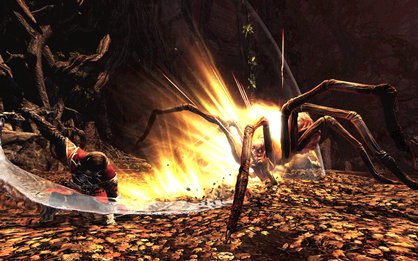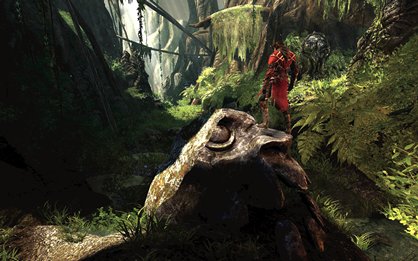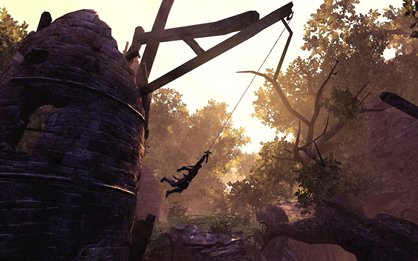How could you top series’ legend Dracula as the main villain? How likely is he to return?
That’s something people will need to play the game to find out about. Konami’s history of producing great quality action games is testament to what we are trying to achieve here. Of course, the 20+ years of CV history itself is something that is rich and interesting too. My biggest hope is that players who perhaps have never played a Castlevania game will pick this up and be excited with what we are doing.

You’ve said bosses are a focus, but fights won’t be dominated by Quick Time Events (QTEs). Can you give us an example of how Gabriel might fight a Titan-sized boss?
The Ice Titan from the trailer is a real-time combat and platforming experience. You climb the Titan’s arm by using the Combat Cross’s Grip ability. He punches the ice in the lake to try to smash you and gets his fist stuck, so you take the opportunity to latch on.
The surface of the Titan has gripping points, allowing you to make your way to one of the runes that animate the creature. Stab the rune with the Combat Cross and you’ll destroy it. The Ice Titan will then try to swat you off, but this allows you to swing from one hand to the other.
Break the Titan’s chest rune, and it’ll reel in pain, allowing you to swing from the Titan’s chin, over his shoulder and onto his back. Climb across, but beware of falling debris and the Titan swatting you away. Climb onto his head to find the final rune. Problem is the Titan will try to knock you off and shake his head to dislodge you. But… well, there are some more surprises, but that’s basically how the Titan fights work.
It’s a stage in itself where you have to use all of your platforming abilities to get to the runes. Everything is in real time and there are no QTEs in these Titan fights. You go from point A to B, but on a gigantic enemy. Oh, and the Ice Titan is the smallest Titan in the game…
Sign up to the GamesRadar+ Newsletter
Weekly digests, tales from the communities you love, and more

What examples can you give of the game’s platform and puzzle elements? Which other games might these sections feel similar to?
Platforming uses the Combat Cross, allowing Gabriel to grip, climb, rappel and shimmy. He can jump and swing too – the inspiration was Super Castlevania 4. I love the way the whip was used to latch onto points and swing around. Puzzles are mostly about finding keys, pulling levers etc. Since this is a 3D environment, many levels have secrets and hidden items, encouraging you to explore. This is an important difference – we have cool combat, but we also give players problems that thinking and exploration will overcome.
If you missed anything, we’ll tell you at the end of each stage. We’ll also give you a completion percentage for the game. Some things are out of reach and you need a certain relic or ability to get it, which won’t be given until later in the game. Often, this will mean returning to an area later on.

When was the last time you spoke to Hideo Kojima and what’s the most surprising thing he’s told you?
Kojima-san has brought experience and wisdom to the project. Frankly, the game wouldn’t be as good without him. Remember that he’s been developing games for 20-plus years and most of his team have too.
On a technical level, they’ve helped us with many things – with Gabriel and facial animations, design and more. I get videos from them highlighting issues, and that’s really useful. The most surprising thing he’s told me was that he felt Mercury Steam could teach them some things about game development.
That’s typical of Mr. Kojima; he’s generous and he’s always looking at ways to improve what he does. Having someone of his caliber helping is a once-in-a-lifetime chance that the Castlevania team is truly grateful for.
Mar 23, 2010


